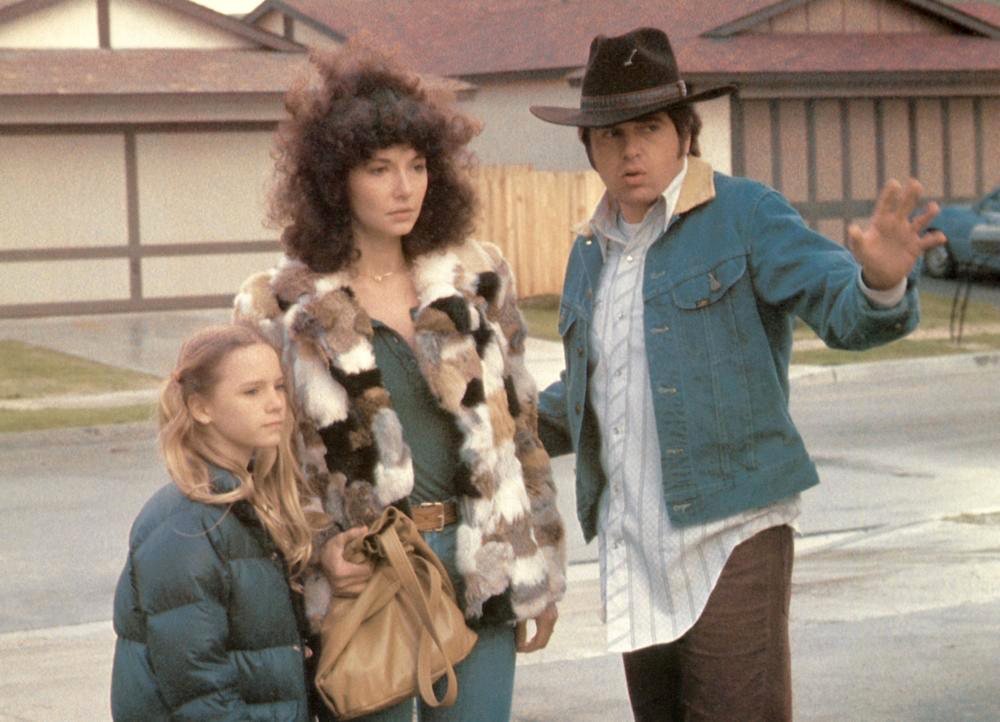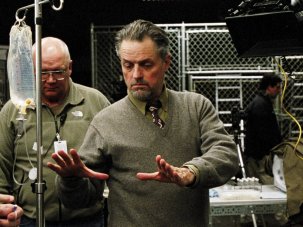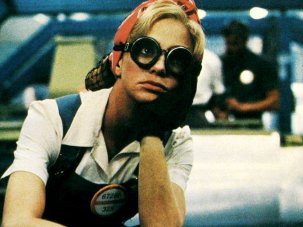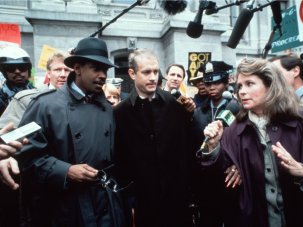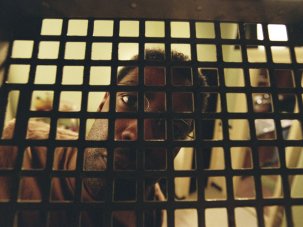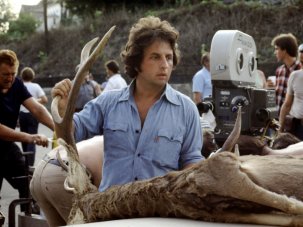If any American filmmaker can be said nowadays to conform to the once prevalent model of distinctive craftsmanship operating within the broad confines of assorted medium-budget material (comparable with, for random example, Robert Wise in an earlier generation), it might well be Jonathan Demme. Proceeding from exploitation (the dynamic, if erratic, Crazy Mama) to latter-day populist comedy (Citizens Band) and then to an immensely stylish if ultimately hollow exercise in ‘movie brat’ Hitchcockiana (Last Embrace), Demme has now made in Melvin and Howard his relatively most prestigious movie, yet at the same time the one most obviously anchored to its own historical moment.
This is partly, of course, because Melvin and Howard deals with actual events of the 70s: its principals are Howard Hughes and the impecunious working man Melvin Dummar by whom, according to Melvin, Hughes was given a lift after cracking up his motorcycle in the Nevada Desert, and to whom – again by his own version, for the courts subsequently disallowed the claim – Hughes willed a share of his fortune.
Demme’s film begins with the curious nocturnal vignette of the purported desert meeting, with the decrepit Hughes slumped in the corner of Melvin’s pick-up truck, being badgered out of a pardonable reluctance to join in singing a grotesque Yuletide pop song composed by his rescuer, then hesitantly offering a solo rendition of what he claims to be the only song he knows, Bye, Bye, Blackbird. But Hughes, a husklike Jason Robards, then disappears from the narrative, which is devoted to the peripatetically jumbled marital affairs of Melvin (Paul le Mat, star of Citizens Band) and the wife, Lynda (Mary Steenburgen), who first leaves him, is then cajoled into remarriage after Melvin divorces her, and finally walks out again.
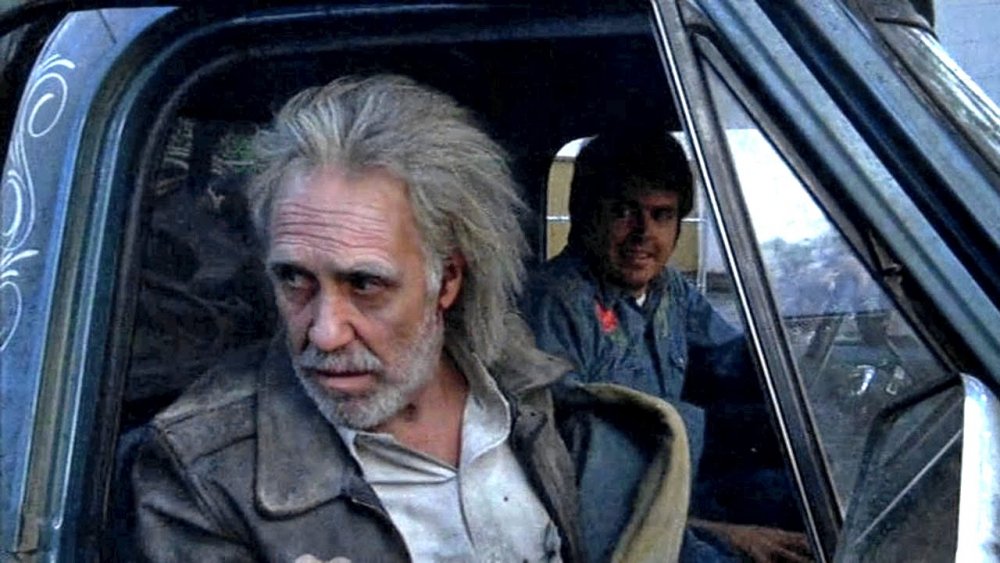
Jason Robards as Howard Hughes
And it is here that Melvin and Howard is recognisably – even, at a slight remove in time, archetypally – a film of the 70s in form as well as content. It may not strictly be a road movie, though the credit sequence, with its seemingly endless ribbon of highway unspooling in front of Melvin’s headlights, certainly hints at the genre. But with its constant shifts of locale, hopping from Nevada to California and back and on to Utah, and with the successive peregrinations of its central characters, even if these more often take place off-screen, it frequently feels a lot like one. And it remains open-ended, an effect heightened by the use of a device prevalent in many comparable 70s movies – The Sugarland Express, for instance – whereby captions form a postscript to the action, undercutting a conventional resolution and underlining the implications of an historical present.
For the film’s grip is exerted primarily by a sense of casual verisimilitude, and in keeping with this Tak Fujimoto’s camerawork, though frequently mobile, has the ostensibly free-form directness of a television reportage. What it conjures up is a hire-purchase, shift-work world of ‘affluent’ squalor, of watching daytime TV in a crowded trailer while outside the ‘repo’ men arrive to take back the car. It is a world, too, which tends to foster hard-nosed pragmatism: Bonnie, with whom Melvin ultimately settles down, after a fashion, to run a gas station, propositions him with the declaration that she has her kids’ support grant money “all saved up”.
Affectionately good-humoured as much of the observation is – especially that of the mutual devotion between Melvin and his young daughter – the film’s eye is, if never savage, then sometimes at least moderately scathing. This is most evident in the sequence of Melvin’s re-marriage to the now heavily pregnant Lynda, which with its trickily fast editing is the nearest the movie comes to a stylised set piece: having opted for Hawaiian drums to accompany the ceremony, the newly-weds are able, after an elderly hired witness has to retire in a state of collapse, to recoup the cost of the proceedings by themselves taking his place for a succession of other couples.
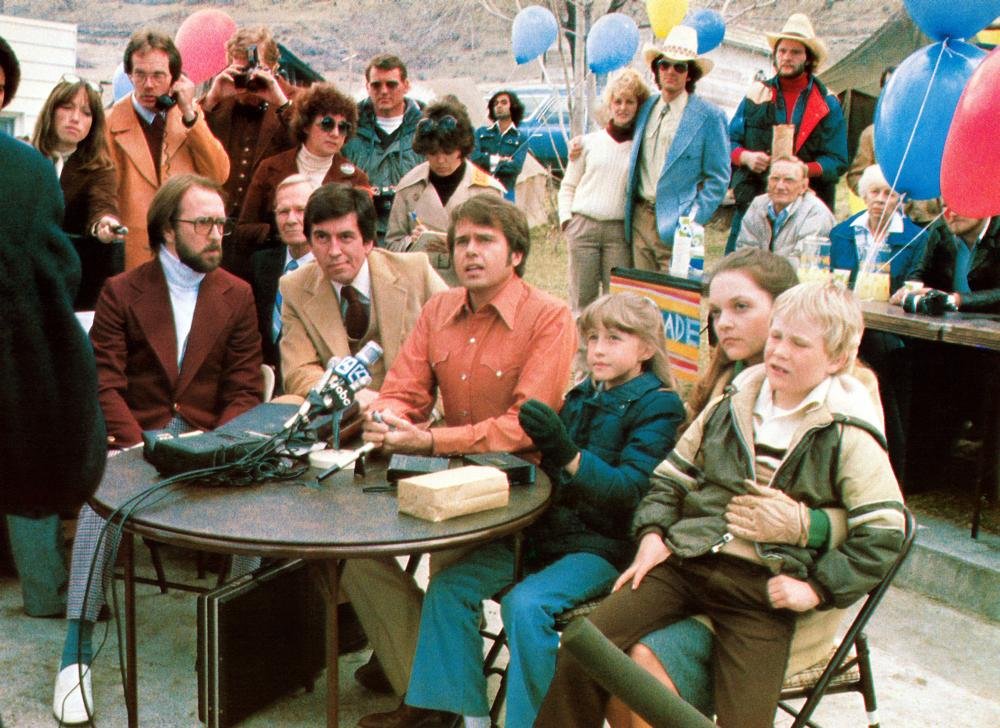
Later, when they are in the money, thanks to Lynda’s winning $10,000 on a TV show, disequilibrium persists as Melvin precipitates his spouse’s second departure by insisting on making down-payments on a giant Cadillac and matching yacht. The film creates an image of momentarily chilling absurdity as Melvin – watching a taxi bear his wife and children away – stands beside this vessel, forlornly beached in his backyard, while its radio blurts out static-laden answers to his earlier, gleefully proprietorial queries to the coastguard, as if in hollow mockery of his aspirations to the idle class. (British TV viewers may be reminded here of the life and bad times of Spend, Spend, Spend pools winner Vivian Nicholson.)
Despite these darker intimations, and the fact that in Bo Goldman’s screenplay the pattern of repetitions at the level of both incident and detail locks the proceedings into more of a closed system than their quickfire surface might suggest, Melvin and Howard retains an essential buoyancy and enthusiasm. It is perhaps relevant that, in a Truffautesque ‘privileged moment’, the real Melvin Dummar’s tiny guest appearance is as a snack-bar attendant conspicuous for his affability.
Melvin and Lynda may be shown as snagged in a largely fruitless quest for the dreams that money can buy, but the movie manages modestly to realise for them one or two of the dreams that it can’t, in the genial epiphanies of their respective performances to cheering crowds, Lynda’s tap dance on the TV show and Melvin’s rockabilly turn at the works Christmas dance, episodes recorded with a quite unpatronising air of involvement.
Moreover, the ending endorses this vein of optimism by setting a seal on Melvin’s staunch insistence that, whatever the upshot of litigation, what really matters is that, once upon a time, “Howard Hughes sang my song”. The concluding sequence offers the jauntily down to earth, and literally upbeat, fantasy of Hughes, the hobo millionaire, taking over the wheel of Melvin’s truck as the couple combine in a hearty duet of Bye, Bye, Blackbird while they drive away into the darkness. It is not just the warmth but also the shrewdly anti-climactic quality of this ending which testifies to that unpretentious certitude in Demme’s handling and marks him as a director well worth watching.
Jonathan Demme in the Sight & Sound archive
Get access to our digital archive for more of our writing about the films of Jonathan Demme, including:
Caged Heat
Review: Monthly Film Bulletin December 1975, page 258
Crazy Mama / Crazy Ladies
Review: Monthly Film Bulletin April 1981, pages 64-65
Fighting Mad
Review: Monthly Film Bulletin August 1976, page 165
Citizens Band
Review: Monthly Film Bulletin November 1978, page 216
Last Embrace
Review: Monthly Film Bulletin November 1980, page 216
Melvin and Howard
Review: Monthly Film Bulletin April 1981, page 72
Swing Shift
Review: Monthly Film Bulletin December 1985, pages 390-391
The Perfect Kiss
Review: Monthly Film Bulletin September 1985, page 295
Something Wild
Feature: Sight & Sound Winter 1986/87, pages 30-31 (considered with True Stories and Blue Velvet)
+ Review: Monthly Film Bulletin July 1987, pages 217-219
Swimming to Cambodia
Review: Monthly Film Bulletin September 1987, page 284
Married to the Mob
Review: Sight & Sound Summer 1989, pages 210-211
+ Review: Monthly Film Bulletin July 1989, pages 209-210
The Silence of the Lambs
Review: Sight & Sound June 1991, pages 53-54
+ A.L. Kennedy column: Sight and Sound June 1995, page 34
Philadelphia
Review: Sight & Sound March 1994, pages 45-46
Storefront Hitchcock
Review: Sight & Sound January 1999, pages 57
Beloved
Review: Sight & Sound March 1999, pages 34-35
The Truth About Charlie
Review: Sight & Sound August 2003, pages 60, 62
The Manchurian Candidate
Review: Sight & Sound December 2004, pages 55-56
Rachel Getting Married
Preview: Sight & Sound November 2008, pages 24-32
+ Review: Sight & Sound February 2009, pages 69-70
Ricki and the Flash
Review: Sight & Sound October 2015, page 95
-
The Digital Edition and Archive quick link
Log in here to your digital edition and archive subscription, take a look at the packages on offer and buy a subscription.




